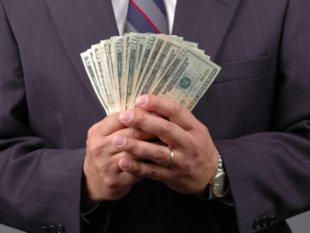
Date: 2025-04-06 Page is: DBtxt003.php txt00006231
3 Ways the Super-Rich Suck Wealth out of the Rest of Us ... The financial industry has, in effect, created a whole new share of global wealth and redistributed much of it to itself.
Burgess COMMENTARY
Peter Burgess
3 Ways the Super-Rich Suck Wealth out of the Rest of Us ... The financial industry has, in effect, created a whole new share of global wealth and redistributed much of it to itself.

Photo Credit: Shutterstock.com/ Carlos E. Santa Maria
The facts are indisputable, the conclusion painful. The wealthiest people in the U.S. and around the world have used the stock market and the deregulated financial system to lay claim to the resources that should belong to all of us.
This is not a matter of productive people benefiting from their contributions to society. This is a relatively small number of people extracting massive amounts of money through the financial system for accomplishing almost nothing.
1. They've Taken $1.6 Million Per Family in New Wealth Since the Recession
The richest 5% of American families each gained at least that much in five years, mostly from the stock market. Using data from Credit Suisse, the Economic Policy Institute, Pew Research, and the Census Bureau and two separate analyses (shown here and here), this extraordinary wealth grab can be calculated.
To briefly summarize, the richest 5% (six million households) own about two-thirds of the wealth, or about $10 trillion of the $15 trillion in financial wealth gained since the recession. That's $1,667,000 per household. Calculations based on alternate sources resulted in a gain of over $2 million per household.
It is noteworthy that most of their windfall came from stock market gains rather than from job-creating business ventures. The stock market has, once again, been forming an overblown bubble of wealth that does not reflect the relative degrees of productivity of workers around America. The market has more than doubled in value since the recession, and the richest 5% own about 80% of all non-pension stocks.
2. They Create Imaginary Money That Turns Real
The world's wealth has doubled in a little over ten years. The financial industry has, in effect, created a whole new share of global wealth and redistributed much of it to itself.
In the U.S., financial sector profits as a percentage of corporate profits have been rising steadily over the past 30 years. The speculative, non-productive, and fee-generating derivatives market has increased to an unfathomable level of over $1 quadrillion -- a thousand trillion dollars, twenty times more than the world economy.
With the U.S. driving the expansion of this great bubble of wealth, our nation has become the fifth-most wealth-unequalcountry in the world, while global inequality ( between rather than within countries) has become even worse than for any one country. Just 250 individuals have more money than the total annual living expenses of almost half the world - three billion people.
3. They've Stopped Payment on Productive Americans
Reputable sources agree that the working class has not been properly compensated for its productivity, and that the 'rent-seeking' behavior of the financial industry, rather than changes in technology, is extracting wealth from society.
As a result, our median inflation-adjusted household wealth has dropped from $73,000 to $57,000 in a little over 25 years. We've lost another five percent of our wealth since the recession.
Shockingly, only one out of four Americans, according to a survey by Bankrate.com, 'have six months' worth of expenses for use in emergency, the minimum recommended by many financial planning experts.'
The End Result? That suction-like sound is the financial industry soaking up our country's wealth.
Paul Buchheit is a college teacher, a writer for progressive publications, and the founder and developer of social justice and educational websites (UsAgainstGreed.org, PayUpNow.org, RappingHistory.org).